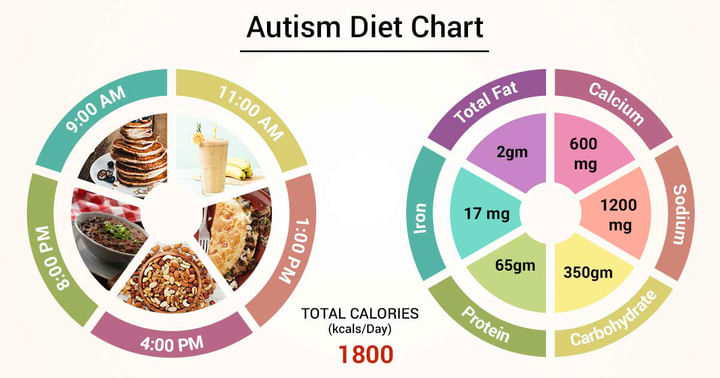Diet Chart For autism
Last Updated: Jan 20, 2025
About
Autism is the disability that affects more than 10 million children in India, with more than 1 in 88 children born with this disease. In India, there is a lack of awareness about autism amongst parents, teachers. Children with autism are less likely to exhibit social understanding and suffer inability in communication. They generally do not approach spontaneously or imitate and respond to emotions, however, they do form attachment with their caregivers. These children suffer more loneliness compared to non-autism children. Making friendship often proves to be difficult for those with autism.
Some of the classic symptoms of autism include unusual attachment to objects, repetitive behaviour, and language delay. Strategies like calm music can be used which will help anxious children with autism. There is no cure but a proper autism diet can be maintained. The autism diet includes gluten free/casein free food items. This diet strictly eliminates gluten items like wheat and barley along with casein items like dairy products. The autism diet might be able to reduce the symptoms and thus help in better communication and social interactions.
Diet Chart
| Sunday | |
| Breakfast (8:00-8:30AM) | Oats Pancakes (small 4-5) + Maple Syrup (2 tsp) |
| Mid-Meal (11:00-11:30AM) | Banana Shake (1 glass) |
| Lunch (2:00-2:30PM) | Mushroom n Herb Omlet (1 serving) |
| Evening (4:00-4:30PM) | Dry Fruits |
| Dinner (8:00-8:30PM) | Kidney Beans curry (1/2 cup) with 1/4 Fresh Lemon |
| Monday | |
| Breakfast (8:00-8:30AM) | Boiled Veg Salad with Egg Whites (2) (1 cup) + Orange Juice (1 glass) |
| Mid-Meal (11:00-11:30AM) | Tender Coconut water (1 glass) |
| Lunch (2:00-2:30PM) | Quinoa with Veggie (1 cup) |
| Evening (4:00-4:30PM) | Yoghurt Smoothie (1 glass) |
| Dinner (8:00-8:30PM) | Bottle Gourd n Shrimp Salad with Grated Coconut (1 cup) |
| Tuesday | |
| Breakfast (8:00-8:30AM) | Paleo Coconut Torte with Blueberries (1/2 cup) + Pineapple Juice (1 glass) |
| Mid-Meal (11:00-11:30AM) | Tender Coconut water (1 glass) |
| Lunch (2:00-2:30PM) | BBQ Salmon n Parboiled Rice (1 cup) |
| Evening (4:00-4:30PM) | Fresh Lime Water (1 glass) |
| Dinner (8:00-8:30PM) | Chickpea n Paneer Salad (1/2 cup) |
| Wednesday | |
| Breakfast (8:00-8:30AM) | Grape Fruit Smoothie (Banana,Lemon,Strawberry,Yoghurt) + 5-6 Almonds |
| Mid-Meal (11:00-11:30AM) | Cottage Cheese (1/2 cup) with Honey(2 tsp) |
| Lunch (2:00-2:30PM) | Baked salmon with Coconut milk (1 cup) |
| Evening (4:00-4:30PM) | 4-5 Almonds + 5-6 Raisins |
| Dinner (8:00-8:30PM) | Avocado Shrimp Salad with Yoghurt (1/2 cup) |
| Thursday | |
| Breakfast (8:00-8:30AM) | Quinoa with Apple n Walnuts (1 cup) |
| Mid-Meal (11:00-11:30AM) | Grapes (1 cup) |
| Lunch (2:00-2:30PM) | Chicken Green Thai curry with White Parboiled Rice (1 cup) |
| Evening (4:00-4:30PM) | Yoghurt (1/2 cup) n Cucumber Strips(4) |
| Dinner (8:00-8:30PM) | Lentil Soup with Parboiled Rice (1/2 cup) |
| Friday | |
| Breakfast (8:00-8:30AM) | Meusli n Strawberry with Milk (1 cup) |
| Mid-Meal (11:00-11:30AM) | Tender Coconut water (1 glass) |
| Lunch (2:00-2:30PM) | Roasted Chicken n Quinoa Salad (1 cup) |
| Evening (4:00-4:30PM) | Carrot Strips (4) + Coriander n Mustard Sauce |
| Dinner (8:00-8:30PM) | Baked Fish with Spinach n Yoghurt Salad (1 cup) |
| Saturday | |
| Breakfast (8:00-8:30AM) | Scrambled Eggs(2) with Baked Tomato(2) n Mushrooms (1/2 cup) + Green Tea (1 cup) |
| Mid-Meal (11:00-11:30AM) | Pomegranate (1/2 cup) |
| Lunch (2:00-2:30PM) | Simple Baked Salmon curry with Parboiled Rice (1 cup) |
| Evening (4:00-4:30PM) | Fresh cut Tomatoes with Sprinkled salt (2 med. sized) |
| Dinner (8:00-8:30PM) | Veg Salad |
Food Items To Limit
- Dairy : When casein (one of the proteins in dairy) mixes with stomach acid, it produces something called an exorphin. Exorphins bind to the opioid receptor sites and can result in a myriad of troubles – brain fog, spaciness, inability to concentrate, and a numbness to pain.
- Gluten : A mixture of proteins found in grains such as wheat, barley, and rye, gluten can increase inflammation when ingested. In fact, your body can create antibodies to gluten which can fire up, or inflame, your brain.
- Corn : There is simply nothing truly beneficial and many potentially harmful things that can come from eating corn.
- Sugar : Avoiding sugar and refined carbohydrates and increasing lean protein can dramatically improve concentration and judgment, and decrease impulsiveness.
- Artificial Ingredients : Avoid all additives, preservatives, dyes and artificial colors, artificial flavorings, and artificial sweeteners.
Do's And Dont's
Do's And Dont's
- Limit food/drink which is calorie empty or nutritionally unhealthy (junk food)
- Offer appropriate serving sizes (not too much on the plate)
- Make food attractive (try different shapes, colours)
- Offer new foods early in the day (not when child is tired or already full)
- Offer different/new foods when child is hungry / thirsty
- Involve child in food preparation if possible
- Grind vitamin and calcium supplements finely then add to food (e.g. can mix into peanut butter, jam without altering the taste)
- Have a preferred toy at hand so that it is played with rather than the food itself
Food Items You Can Easily Consume
- Milk Substitutes : Be sure the container states the product is casein-free, not just dairy-free.
- Gluten-free Bread : These breads are made from rice or tapioca flour. The taste and texture are different from regular bread.
- Cheese Substitutes : Check the ingredient list before purchasing any alternative cheese, as some brands that are labeled "dairy-free" may still contain the casein protein.
- Meat : Prepackaged or frozen meat may contain spices that are not gluten-free, so it's important to check the list of ingredients.
- Produce : Fresh fruit and vegetables are usually safe choices for gluten/casein-free foods.
References
- Elder JH, Shankar M, Shuster J, Theriaque D, Burns S, Sherrill L. The gluten-free, casein-free diet in autism: results of a preliminary double blind clinical trial. Journal of autism and developmental disorders. 2006 Apr 1;36(3):413-20. [Cited 27 June 2019]. Available from:
- Whiteley P, Rodgers J, Savery D, Shattock P. A gluten-free diet as an intervention for autism and associated spectrum disorders: preliminary findings. autism. 1999 Mar;3(1):45-65. [Cited 27 June 2019]. Available from:
- Elder JH. The gluten‐free, casein‐free diet in autism: an overview with clinical implications. Nutrition in Clinical Practice. 2008 Dec;23(6):583-8. [Cited 27 June 2019]. Available from:
Table of content
Find Dietitian/Nutritionist near me
Ask a free question
Get FREE multiple opinions from Doctors



